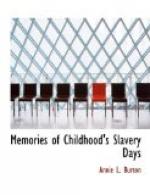Five years ago, I began to go to the Franklin evening school. Mr. Guild was the master. At one time he requested all the pupils to write the story of their lives, and he considered my composition so interesting he said he thought if I could work it up and enlarge upon it, I could write a book. He promised to help me. My teacher was Miss Emerson, and she was interested in me. But the next year Miss Emerson gave up teaching, and Mr. Guild died.
In each of the terms that I have attended, I have received the certificates showing that I have been regular and punctual in attendance, have maintained good deportment, and shown general proficiency in the studies. I would have graduated in 1907, had it not been for sickness. The following was to have been my graduating composition.
ABRAHAM LINCOLN
BY
ANNIE L. BURTON
In a little clearing in the backwoods of Harding County, Kentucky, there stood years ago a rude cabin within whose walls Abraham Lincoln passed his childhood. An “unaccountable” man he has been called, and the adjective was well chosen, for who could account for a mind and nature like Lincoln’s with the ancestry he owned? His father was a thriftless, idle carpenter, scarcely supporting his family, and with but the poorest living. His mother was an uneducated woman, but must have been of an entirely different nature, for she was able to impress upon her boy a love of learning. During her life, his chief, in fact his only book, was the Bible, and in this he learned to read. Just before he was nine years old, the father brought his family across the Ohio River into Illinois, and there in the unfloored log cabin, minus windows and doors, Abraham lived and grew. It was during this time that the mother died, and in a short time the shiftless father with his family drifted back to the old home, and here found another for his children in one who was a friend of earlier days. This woman was of a thrifty nature, and her energy made him floor the cabin, hang doors, and open up windows. She was fond of the children and cared for them tenderly, and to her the boy Abraham owed many pleasant hours.
As he grew older, his love for knowledge increased and he obtained whatever books he could, studying by the firelight, and once walking six miles for an English Grammar. After he read it, he walked the six miles to return it. He needed the book no longer, for with this as with his small collection of books, what he once read was his. He absorbed the books he read.
During these early years he did “odd jobs” for the neighbors. Even at this age, his gift of story telling was a notable one, as well as his sterling honesty. His first knowledge of slavery in all its horrors came to him when he was about twenty-one years old. He had made a trip to New Orleans, and there in the old slave market he saw an auction. His face paled, and his spirits rose in revolt at the coarse jest of the auctioneer, and there he registered a vow within himself, “If ever I have a chance to strike against slavery, I will strike and strike hard.” To this end he worked and for this he paid “the last full measure of devotion.”




